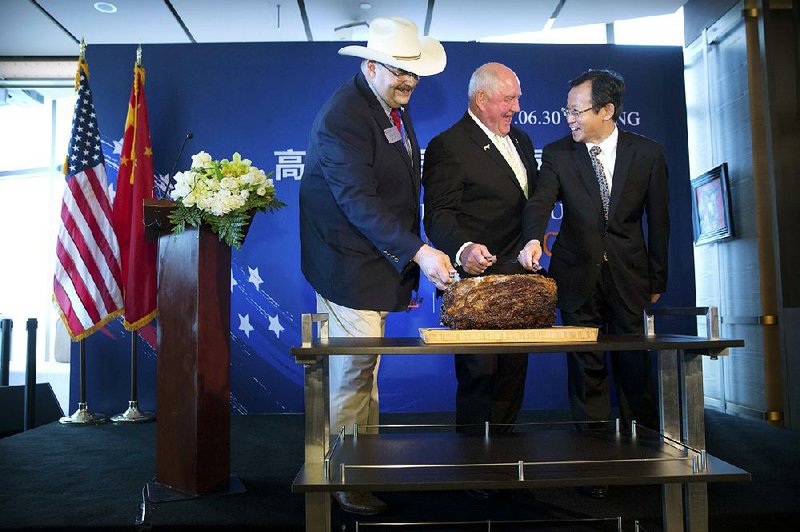A Sam's Club membership store in Beijing is the first physical retail outlet in China to sell U.S. beef after the 13-year trade hiatus, according to a Wal-Mart spokesman.
Wal-Mart was able to react quickly because of its relationship with Tyson Foods Inc., Wal-Mart spokesman Rebecca Lui said.
"When we knew that the China beef ban was lifted, we acted fast and worked closely with our supplier Tyson to get the beef to market," Lui said.
On Tuesday, the Beijing location sold the first U.S. sourced beef cuts in a physical retail outlet, Lui said in a statement.
"Sam's Club was able to leverage Walmart's global sourcing strength to deliver a limited first batch of high-quality U.S. beef to the Beijing location," Lui said. "We started with boneless short rib, a premium and tender part of the meat that is very popular among Chinese."
In April, President Donald Trump and Chinese President Xi Jinping negotiated their international trade relationships during the World Trade Summit. Since 2003, U.S. beef has been banned from China after a single mad cow scare out of Washington state. After the summit, Xi announced the reopening of China's beef market to the U.S. as long as guidelines were in place.
With a 30-hour chilled supply chain, Sam's Club is able to deliver prime- and choice-grade short ribs from Nebraska to store locations in China, according to the statement. One of the few facilities approved to ship beef to China is a Tyson Fresh Meats plant in Nebraska.
"Supply chains can be competitive advantages and therefore corporate secrets, similar to KFC's secret recipe," John Kent, director of the UA Supply Chain Management Research Center, said in an email. "Trusted supply chain relationships matter in successful business strategy (i.e. Tyson to Wal-Mart helps both companies)."
Currently, only beef produced by USDA-approved companies in Iowa, Kansas and Nebraska is eligible for shipment to China. Like all imported U.S. beef cuts, those sold at Sam's Club stores in China are in accordance with regulations from the U.S. Meat Export Federation.
U.S. beef imports are sourced from cattle under 30 months of age, free of antibiotics and hormones, and each cow is "uniquely identified and traceable back to the farm of origin," Lui said.
The Sam's Club store in Shenzhen, China, has been the highest-grossing location in the world for the past nine years, Lui said.
While Sam's Club may be the first physical retailer to sell U.S. beef in China, other e-commerce retailers in China added imported beef to their online sales portfolios more than a week ago.
Analysts anticipate e-commerce sales in China to continue growing rapidly, especially for grocery and food purchases. In 2015, 15 percent of total retail sales were online, and those sales are projected to double to 30 percent by 2018, according to a study from Meat & Livestock Australia.
Womai.com, an online platform run by China's largest food trader, made available for pre-order a total of 663 pounds of U.S.-sourced rib-eye steaks on June 23. More than 1,500 orders had been placed over the span of five days. JD.com, one of the country's largest retailers, has also been accepting pre-orders ahead of a scheduled mid-July availability date.
Business on 07/01/2017

